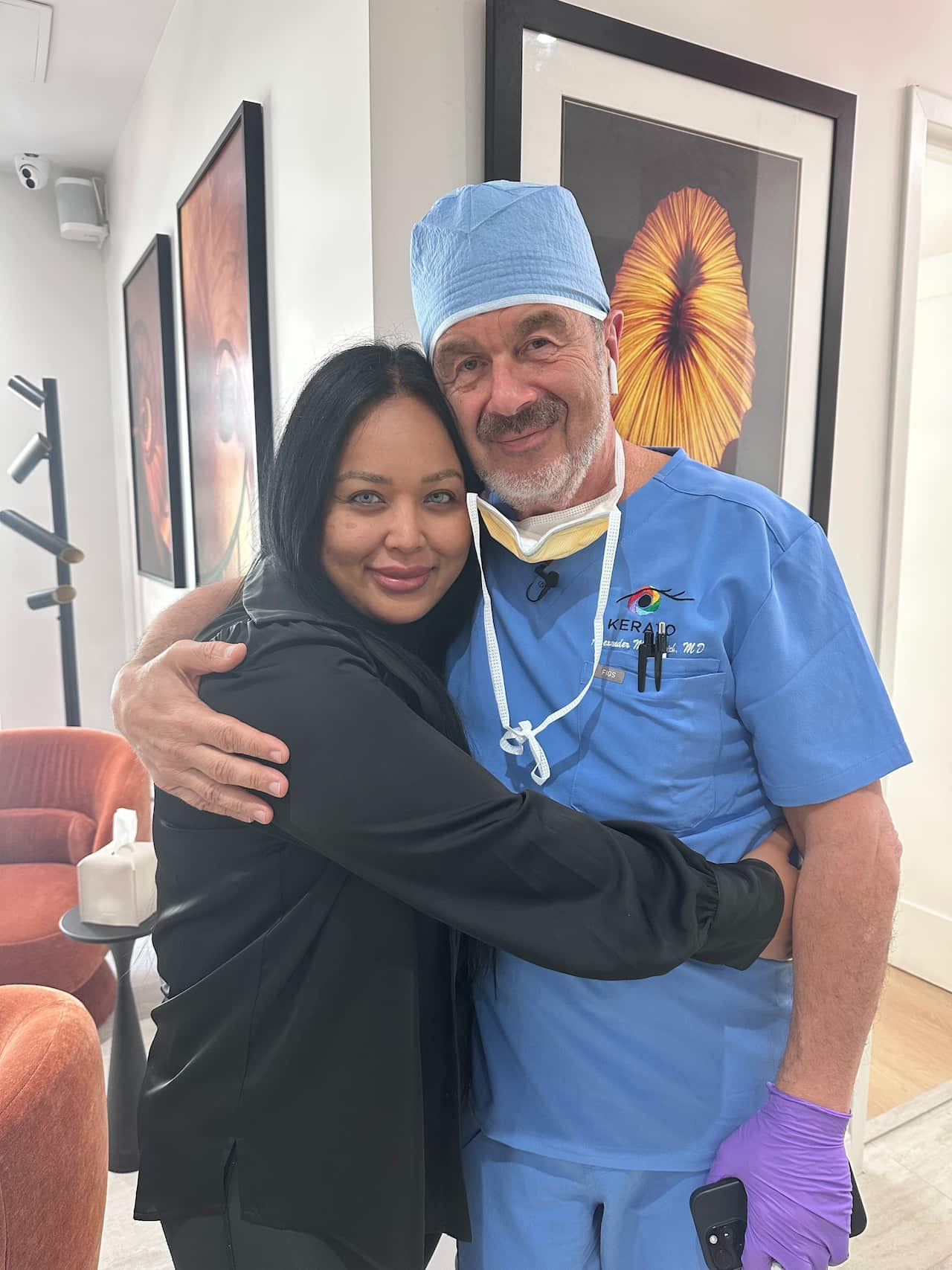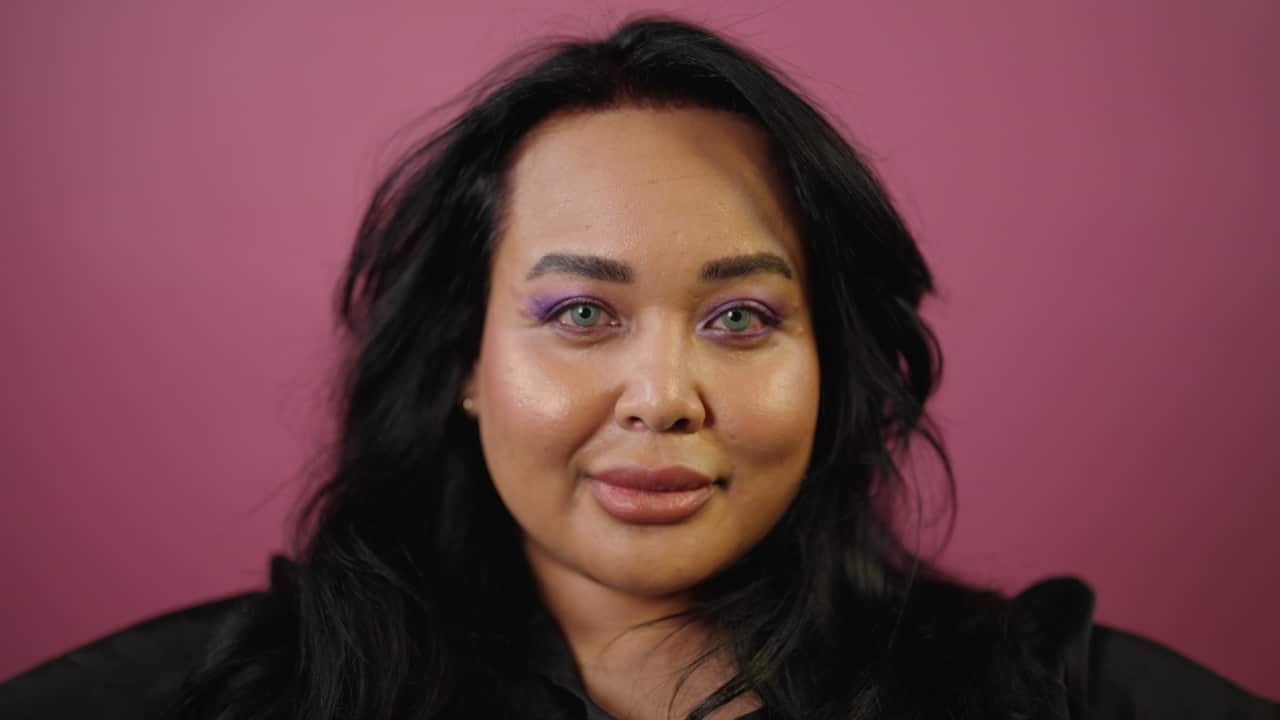For most of her life, Samantha Fleck, 41, said she felt misaligned with her dark-brown eyes.
"I was roughly around 15, 16, I noticed that something didn't sit well, and I felt out of place in my own looks," Samantha, who lives in Sydney, told The Feed.
So for about 20 years, Samantha wore green-coloured contact lenses every day.
She spent a decade researching a way to permanently change her eye colour, before she discovered keratopigmentation this year. The procedure, which alters the colour of the iris for good, involves using a laser to insert a coloured dye through a micro-tunnel made in the cornea.
"I always had this vision of changing my eye colour," she said.
"It's been a lifelong goal and dream of mine to be myself."
But with keratopigmentation not available in Australia due to the risks associated with it, Samantha travelled to the US and including flights, accommodation and the $18,000 procedure, spent about $30,000 to have her brown eye colour permanently changed.
Forty minutes later, Samantha had jade-green eyes, with an outline of her original colour still visible, a common outcome in the procedure.
"All my contacts have always been green — people wouldn't be able to distinguish between this eye colour and my contacts from before," she said.

And now, after the procedure, Samantha said she finally feels like herself.
"It’s changed my life dramatically, emotionally ... It’s more than just aesthetics and social perception of a person … It's fulfilling that inner calling."
"Now when I look in the mirror, I just see myself."
'People can go blind'
While LASIK — a laser eye procedure used to improve vision by reshaping the cornea — is used medically, keratopigmentation has been gaining popularity in recent years as a cosmetic trend fuelled by social media.
TikTok and Instagram videos documenting eye-colour "transformations" have amassed millions of views, helping push the procedure into mainstream conversations. But these videos are often littered with comments asking about the cost and the risks.
But the procedure remains out of the picture in Australia, due to the risks associated with it, Chameen Samarawickrama, a Sydney-based ophthalmologist and eye surgeon, told The Feed.
"We do [keratopigmentation] in eyes that are already blind, and because they're blind, the consequence if anything goes wrong is not that significant," he said.
"People can go blind, and this is not a reversible procedure."
People can go blind. And this is not a reversible procedure.Chameen Samarawickrama, opthalmogolist and eye surgeon
Samarawickrama said the permanent dyes that are put into the eyes are one of the major concerns due to their unknown long-term effects.
"We don't know whether [the dye] is toxic in the long term, we don't know whether it'll fade, whether it'll scar up. The cornea is responsible for 70 to 80 per cent of the focusing. So, any irregularity that can be caused by the dye will cause loss of vision."

A 2018 study published in the British Journal of Ophthalmology suggested a 10-12 per cent risk of complications, Samarawickrama said.
"For what we do, a 10 per cent [risk] is 10 times more than what we would normally expect," he said.
"This is a high-risk procedure."
Risks like light sensitivity and vision loss prompted the American Academy of Ophthalmology to issue a public warning about keratopigmentation last year.
But Samantha weighed it up, and believed the procedure was worth the risk.
"I did as much research as I can and looking from the results of people who've done it before me, there's people who've done the procedure two or three years or four years before me and they've always updated their process, and it reassured me."
A growing global trend
Since 2019, New York ophthalmologist Dr Alexander Movshovich has been performing keratopigmentation, with Samantha being one of his former patients.
"I see a lot of happy people because [they suddenly] in 20 minutes become different people."
He estimates performing about 1,500 procedures in that time at his clinic — but new players in the US as well as countries like Türkiye are now offering the procedure at a cheaper rate.
Ophthalmologists Francis Ferrari and Jorge Alió first performed keratopigmentation in France in 2013, where the technique was shown to other ophthalmologists.
"I actually saw this procedure in [Ferrari's] hands and then I brought it to America, and I was first in America," Movshovich said.

He said most people change from dark eyes to green or blue — with around 10 per cent of patients asking for further work after the procedure.
"'I want to be more, I want to be less' … some people are hungry for changes. There are some people who just want to do it more and more," he said.
Movshovich said the procedure has shown no serious complications over six years at his clinic in the US, however short-term side effects include light sensitivity, redness in the eyes and discomfort (which can sometimes turn into long-term complications).
Dr Chandra Bala, another ophthalmologist based in Sydney, has said he has seen Australians express an interest in changing their eye colour, but warned against keratopigmentation.
"People always aspire to that crystal clear eye. But our job is not to do harm first. When you go and do this, you have no idea what’s going to happen," Bala told The Feed.
He says results can often look unnatural, or "aesthetically displeasing".
"The texture that you get from it is not of the sophistication of the normal eye. So you have a 'ghostly' appearance..."
Bala saw firsthand how things can go wrong, having dealt with a health worker who had undergone keratopigmentation to change the colour of his eyes.
"He was ghostly looking ... he now has depression, all sorts of problems," Bala said.
'Just put contact lenses on'
Samarawickrama said cosmetic keratopigmentation remains outside mainstream ophthalmology in research and use, meaning it’s unregulated and understudied.
"People are striving for a concept of perfection that doesn’t exist. When the procedure goes wrong, the consequence is blindness — and that’s irreversible," he said.
"If someone really wants a light colour, they should just put a contact lens on."
Through award winning storytelling, The Feed continues to break new ground with its compelling mix of current affairs, comedy, profiles and investigations. See Different. Know Better. Laugh Harder. Read more about The Feed
Have a story or comment? Contact Us


